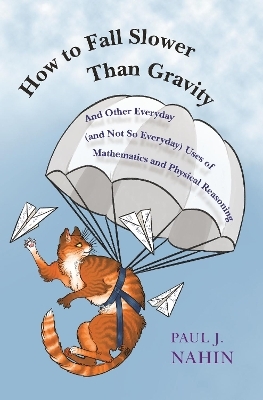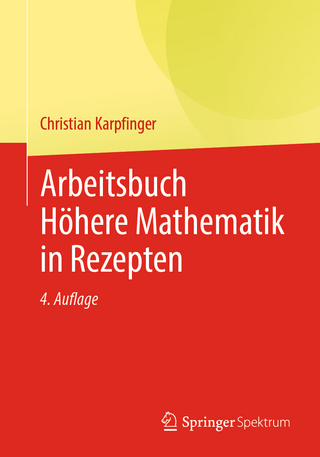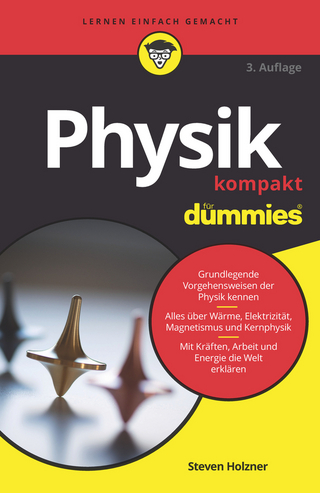
How to Fall Slower Than Gravity
And Other Everyday (and Not So Everyday) Uses of Mathematics and Physical Reasoning
Seiten
2018
Princeton University Press (Verlag)
978-0-691-17691-8 (ISBN)
Princeton University Press (Verlag)
978-0-691-17691-8 (ISBN)
An engaging collection of intriguing problems that shows you how to think like a mathematical physicist
Paul Nahin is a master at explaining odd phenomena through straightforward mathematics. In this collection of twenty-six intriguing problems, he explores how mathematical physicists think. Always entertaining, the problems range from ancient catapult conundrums to the puzzling physics of a very peculiar material called NASTYGLASS—and from dodging trucks to why raindrops fall slower than the rate of gravity. The questions raised may seem impossible to answer at first and may require an unexpected twist in reasoning, but sometimes their solutions are surprisingly simple. Nahin’s goal, however, is always to guide readers—who will need only to have studied advanced high school math and physics—in expanding their mathematical thinking to make sense of the curiosities of the physical world.
The problems are in the first part of the book and the solutions are in the second, so that readers may challenge themselves to solve the questions on their own before looking at the explanations. The problems show how mathematics—including algebra, trigonometry, geometry, and calculus—can be united with physical laws to solve both real and theoretical problems. Historical anecdotes woven throughout the book bring alive the circumstances and people involved in some amazing discoveries and achievements.
More than a puzzle book, this work will immerse you in the delights of scientific history while honing your math skills.
Paul Nahin is a master at explaining odd phenomena through straightforward mathematics. In this collection of twenty-six intriguing problems, he explores how mathematical physicists think. Always entertaining, the problems range from ancient catapult conundrums to the puzzling physics of a very peculiar material called NASTYGLASS—and from dodging trucks to why raindrops fall slower than the rate of gravity. The questions raised may seem impossible to answer at first and may require an unexpected twist in reasoning, but sometimes their solutions are surprisingly simple. Nahin’s goal, however, is always to guide readers—who will need only to have studied advanced high school math and physics—in expanding their mathematical thinking to make sense of the curiosities of the physical world.
The problems are in the first part of the book and the solutions are in the second, so that readers may challenge themselves to solve the questions on their own before looking at the explanations. The problems show how mathematics—including algebra, trigonometry, geometry, and calculus—can be united with physical laws to solve both real and theoretical problems. Historical anecdotes woven throughout the book bring alive the circumstances and people involved in some amazing discoveries and achievements.
More than a puzzle book, this work will immerse you in the delights of scientific history while honing your math skills.
Paul J. Nahin is the author of many popular math books, including In Praise of Simple Physics, Dr. Euler’s Fabulous Formula, and An Imaginary Tale (all Princeton). He is professor emeritus of electrical engineering at the University of New Hampshire. He received the 2017 Chandler Davis Prize for Excellence in Expository Writing in Mathematics.
| Erscheinungsdatum | 13.11.2018 |
|---|---|
| Zusatzinfo | 62 b/w illus., 4 tables |
| Verlagsort | New Jersey |
| Sprache | englisch |
| Maße | 155 x 235 mm |
| Themenwelt | Mathematik / Informatik ► Mathematik ► Algebra |
| Mathematik / Informatik ► Mathematik ► Analysis | |
| Mathematik / Informatik ► Mathematik ► Geometrie / Topologie | |
| ISBN-10 | 0-691-17691-4 / 0691176914 |
| ISBN-13 | 978-0-691-17691-8 / 9780691176918 |
| Zustand | Neuware |
| Haben Sie eine Frage zum Produkt? |
Mehr entdecken
aus dem Bereich
aus dem Bereich
Buch | Softcover (2022)
Springer Spektrum (Verlag)
39,99 €


